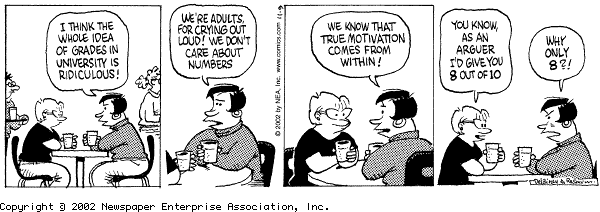 What does all of this mean? What is the best way to measure how well students are actually learning? How do we know which are the students that are really learning and understanding and able to use the knowledge in different situations; and which students are dutifully doing what they are told to do and completing assignments and earning good grades not learning a thing?
What does all of this mean? What is the best way to measure how well students are actually learning? How do we know which are the students that are really learning and understanding and able to use the knowledge in different situations; and which students are dutifully doing what they are told to do and completing assignments and earning good grades not learning a thing?I think our educational system struggles with this question very often. We want to learn--it is the main focus of schools to teach students and to help them to learn. When I say "learn", I mean "real, actual learning". Not memorizing and forgetting. Not memorizing long enough to pass the test. I mean learning; understanding; able to teach it to others; able to use the knowledge at a later time; able to build on the knowledge learned to learn more, higher-level material. How do we measure a student's ability to actually learn? How do we know who is really getting it and who only appears to be really getting it?
Parents see their children's grades. And (I think) parents make a determination of their children's abilities based on the grades that they get in school. That is certainly understandable. We don't expect all parents to be experts in education and we certainly don't expect all parents to be experts in measuring academic ability. And if the grades (the test grades and homework grades and classwork grades and course grades) accurately reflect their children's abilities, then it is OK to use these grades to gain a sense of academic ability.
But what do you do when your child gets great grades in class and lousy grades on the final exam, or the SAT, or the PARCC or Smarter Balanced test, or the college entrance exam? What does it mean when we have students who do great in middle and high school and then cannot handle the academics in college? Once again, What is the best way to measure academic ability? Everyone likes to brag about their smart children; and everyone wants their children "to do well" in school. But at some point we need to have a way to tell if their apparent ability (academically speaking) is actual ability.
Large-scale testing is one way to measure actual academic ability. State-level tests, SAT and ACT, PARCC, Smarter Balanced, and NAEP (National Assessment of Educational Progress) tests are all large-scale tests that attempt to do this. The SAT is a good predictor of a students' ability to do well in their first year of college. The new PARCC and Smarter Balanced tests are supposed to measure student abilities compared to standards that are taught over the previous school year. NAEP is a national test given to a sampling of students in every state and in many subject areas to get a sense of our nation's students academic abilities.
 I think that it is difficult to use a single measure to determine a student's academic ability. If you have a mechanic who has been fixing cars for (say) ten years and you asked her to take a test on fixing cars and then to go through a field test in which she actually fixed cars and then to write an essay on fixing cars, you would expect that she would earn similar scores. This would be provide multiple pieces of evidence that she knows what she needs to know to do her job. I think the same is true for students and academic subjects. If a student is sufficiently knowledgeable in (say) Geometry, I would expect her to demonstrate this knowledge via verbal explanations, written exams, performance tasks, and large-scale testing. And I would expect all of these measures to show a similar level of understanding.
I think that it is difficult to use a single measure to determine a student's academic ability. If you have a mechanic who has been fixing cars for (say) ten years and you asked her to take a test on fixing cars and then to go through a field test in which she actually fixed cars and then to write an essay on fixing cars, you would expect that she would earn similar scores. This would be provide multiple pieces of evidence that she knows what she needs to know to do her job. I think the same is true for students and academic subjects. If a student is sufficiently knowledgeable in (say) Geometry, I would expect her to demonstrate this knowledge via verbal explanations, written exams, performance tasks, and large-scale testing. And I would expect all of these measures to show a similar level of understanding.
Our nation's schools have a responsibility to teach so that our students are truly learning. We cannot accept the mere appearance of learning; we have to do the hard work of ensuring actual, true learning. And we need to continue to develop and revised the best and most effective ways to measure that this "true learning" is actually taking place.


No comments:
Post a Comment